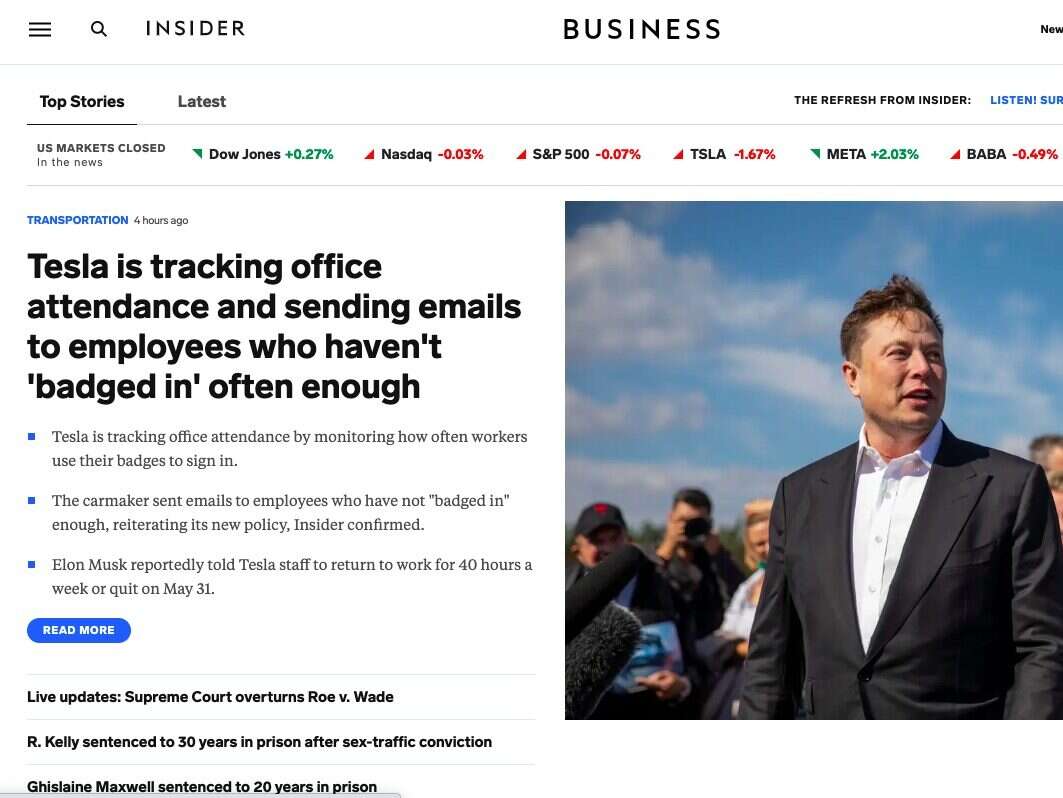
Insider Inc, Forbes and Reuters top the list of the UK’s most popular websites for business news, according to a new ranking by Press Gazette.
According to data compiled by Ipsos iris, The Insider Inc brand which includes the website businessinsider.com and general news side insider.com reached 4.6 million people over 15 in the UK (9% of the population), although businessinsider.com itself attracted 3 million visitors (62% of the brand’s total audience).
Most popular business news websites in the UK (monthly audience)
- Insider Inc (4.6m)
- Forbes (3.8m)
- Reuters News (3.7m)
- Financial Times (2.9m)
- Bloomberg (2.6m)
- WSJ (2m)
- Investopedia (1.2m)
- The Economist (1.1m)
- CNBC (1.1m
- MarketWatch (486,000)
It was followed by Forbes (3.8 million people, 8% reach), Reuters News (3.7 million people, 7% reach) and the Financial Times (2.9 million people, 6% reach).
For the ranking, Press Gazette used Ipsos’ iris ranking of the top online brand groups and selected the biggest which, in Press Gazette’s view, have a significant general business news offering. While general newsbrands such as CNN carry a lot of reporting on business and finance, we focused on brands that were primarily geared to business readership.
Among the 12 brands on the list, Fortune saw the biggest month-on-month growth in readership as the number of readers accessing its sites and apps grew 124% between April and May to over 397,000 people.
The Economist (audience of 1.1 million, up 40%), Forbes (up 11%) and Bloomberg (2.6 million people, up 10%) also saw double-digit growth.
Reuters News (down 16%) and News Corp’s, the Wall Street Journal (2 million people, down 16%) saw the biggest month-on-month falls.
Despite ranking outside the top three for audience reach, the Financial Times led the list when it came to engagement. Readers spent 16 minutes on average with the FT’s content in May - more than twice as long as second-placed Reuters - making the FT the best-ranked business brand in our list when it came to total minutes spent with the brands website and distributed content in May (46.9 million minutes). It was followed by Reuters (23.5 million minutes) and Insider Inc (13.5 million minutes).
The FT also topped the list when it came to page views, racking up three times as many (30.6 million) than closest competitor Insider Inc (10.1 million).
The FT’s steep paywall (£35 per month for a regular subscription) means that engagement is a key imperative for the UK-based publisher.
In March this year, the FT hit one million paying digital subscribers. Malcolm Moore, editor of the FT Edit app told Press Gazette earlier this year that these subscribers were the title’s core audience. “We would call them ‘professional readers’ and that just means they’re willing to pay the high price of the FT because they need the information in there to do their jobs. They need to know M&A activity, what the bond markets are doing, all that kind of stuff,” he said.
Last year a report from the International Media Association (IMA) said that Bulk B2B subscriptions have “huge uncovered potential” for news publishers.
Business titles including the Wall Street Journal and the FT were among those that are tapping into companies’ increased willingness to pay for subscriptions.
The FT charges business customers based on engagement, meaning corporate customers only pay for their readers who consume nine or more articles per month (the point at which users are more likely to renew). Both the FT and WSJ also use account managers to boost engagement of business customers.
Ipsos iris replaced Comscore as the industry-recognised standard in 2021. Ipsos iris data is partly derived from a panel of 10,000 people aged 15 and over that is designed to be nationally representative. The participants have meters installed across 25,000 personal devices to passively measure website and app usage.
This is combined with data from participating websites that are tagged so all devices visiting the site can be identified and logged.
Correction: This story previously stated Fortune was still owned by Time, which has not been the case since 2018.
Press Gazette is hosting the Future of Media Technology Conference. For more information, visit NSMG.live
Email pged@pressgazette.co.uk to point out mistakes, provide story tips or send in a letter for publication on our "Letters Page" blog
